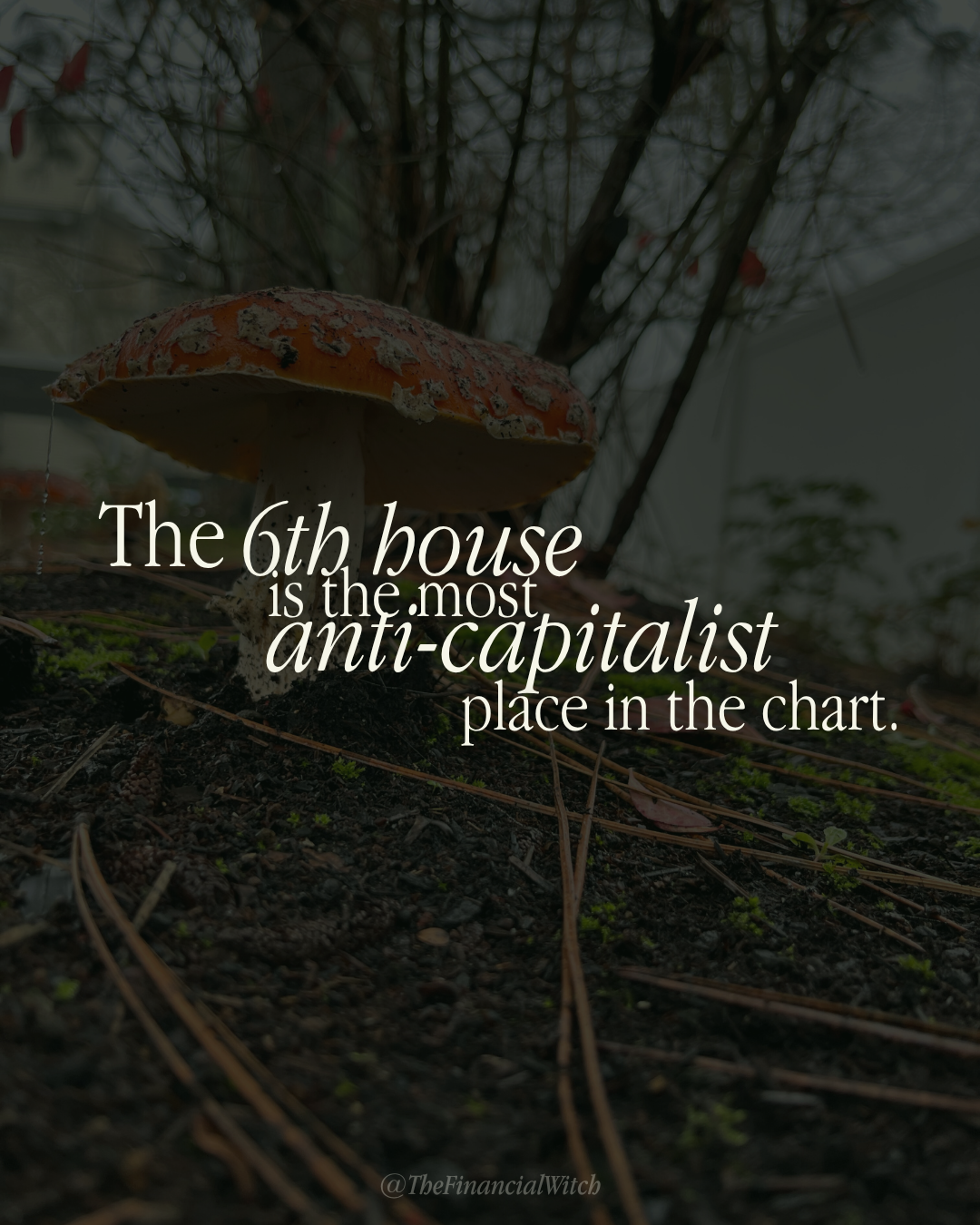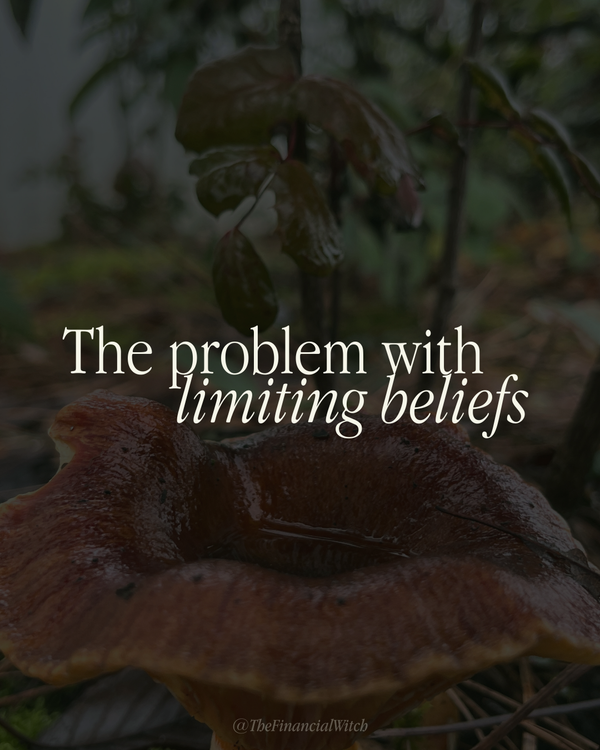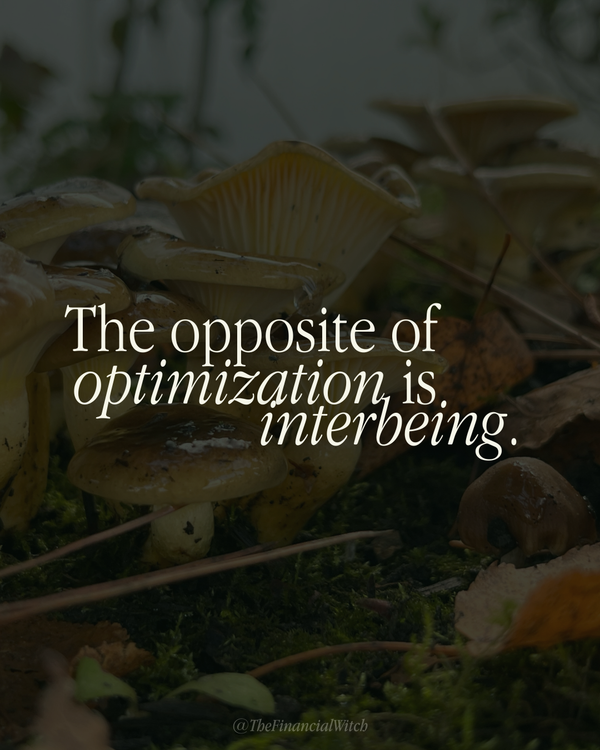The 6th house is the most anti-capitalist place in the chart
We're all selling our bodies under capitalism, and the sixth house is the most honest about that.

The sixth house is often overlooked in mainstream astrology. Sometimes described as the house of work, health, and routines, it gets flattened into questions of daily habits and job performance. But when we approach the houses through an anti-capitalist lens, the sixth house begins to hum with a deeper, more volatile kind of energy. It becomes the house that most plainly confronts the material consequences of capitalism: labor, illness, injury, extraction, and the sacredness of care.
In traditional astrology, the sixth house is not a place of dignity or visibility. It is averse to the ascendant, indicating a lack of visibility and agency. It is cadent, meaning it falls away from the angular houses that signal public power. It is the house where Mars rejoices: a planet of conflict, injury, and heat. In Hellenistic texts, the sixth is associated with those whose labor is demanded but whose agency is denied--think slaves, servants, and soldiers. This is not a house of glory, nor does it offer ease or elevation, but it gathers the lives and labors of those pushed to the margins, and in doing so, it lays bare the contradictions of capitalism and holds the potential for quiet, embodied subversion.
Capitalism mythologizes labor as a path to virtue. It casts work as a moral imperative, a way to prove one’s worthiness, discipline, and reliability. But the sixth house reminds us that work is also suffering. It is chronic pain, it is caretaking with no rest, it is getting up at 5 a.m. to change adult diapers, cook other people’s food, or clean blood out of sheets. The sixth house holds the people who capitalism renders invisible: the sick, the poor, the disabled, the undocumented, the "unskilled," the expendable. This is where we see the cost of survival under capitalism, and where we begin to name it.
We're all selling our bodies under capitalism, and the sixth house is the most honest about that. It doesn’t pretend to be about passion or career ladders or self-actualization through labor. It’s about what we do to survive and what those survival tasks do to us. Within its environment, we witness how deeply capitalism has eroded the sacredness of service. Labor becomes synonymous with subjugation, pain becomes normalized, and rest becomes a threat to productivity. But the sixth house is not only a site of wounding. It also offers conditions that make resistance possible. If capitalism wants us to disown our bodies, to view our needs and our labor as burdens, then the sixth house holds the ground where embodiment can be reclaimed. It becomes the substrate for class consciousness to take root, creating a space in which labor may be reimagined—not as a metric of value but as a means of connection, a way of participating in collective life.
This reclamation is particularly urgent when it comes to disability justice. As Erin T. Shipley has said, the sixth house is one of the primary locations in the chart where we can trace how the body is disciplined under capitalism. It speaks to both chronic illness and the daily labor of living in a world not built for you. To dwell within the sixth house with dignity is to refuse capitalist ableism, and to assert that access, slowness, pain, and need are not obstacles to overcome but conditions to acknowledge, hold, and honor.
The sixth house does not promise mobility, and it doesn’t construct aspiration in the vertical sense. It is not concerned with performance, prestige, or symbolic capital. Rather, it participates in an environment that fosters persistence, interdependence, and the unnoticed labor of daily maintenance. It collects the sediment of lived experience—what gets repeated, what gets absorbed into muscle memory, what sustains life without demanding to be seen. There is a kind of humility in the terrain here, a composting logic that breaks down what is discarded and turns it into nourishment. This is not because the sixth house desires invisibility, but because its soil is structured around the work of support itself. It creates the conditions that allow care, healing, and mutuality to emerge, even when those acts do not become visible or named. If the tenth house is the boss, the sixth house is the worker, though more precisely, the sixth house contains the atmosphere of collective labor. It is the field nurse, the doula, the janitor, the friend who texts you to eat when you forget. It is the place where Mars appears not just as a fighter, but as a defender. And when we allow Mars to be stripped of imperialist expectation, when we allow it to remember the body and its boundaries rather than conquest, the sixth house begins to take on a shape that is more relational than strategic, more resistant than reactionary.
Mars, in this house, speaks to the tension between the invader and the defender, between external threat and internal protection. In traditional texts, Mars can represent the foreigner, the outsider, the displaced, as well as the soldier and defender of land and lineage. In the sixth house, these archetypes press against each other. Mars becomes not just a weapon or an aggressor, but a messenger of inflammation—an immune response rising from within the collective body in order to resist what should not be there. Inflammation, when seen this way, is not the problem, it is the signal. It tells us that harm has occurred, that something has trespassed, that something has tried to force its way into a body or a system that remembers how to say no.
Worker uprisings, general strikes, spontaneous acts of care that bypass state structures—these, too, are symptoms. They are the collective body’s way of pushing back against the infections of capitalism, colonialism, genocide, and extraction. These movements arise not from desire but from necessity, from pressure building beneath the surface until it can no longer be ignored. The sixth house doesn’t initiate revolt for glory, it coexists with the slow conditions under which revolt becomes necessary, and the uprising itself becomes proof of life. To do sixth house work is to tend to the compost, to acknowledge that the body has limits, to understand that maintenance is sacred and that no one is disposable. In a world that extracts, optimizes, and exploits, the sixth house reminds us that care is not a means to an end, it is the work itself.
And so, the sixth house is anti-capitalist not because it seeks to subvert through strategy or intent, but because it reveals the ongoing material costs of survival in a world that demands too much and gives too little. It is the ground that makes labor visible, the coir that supports the mycelium, a house of lived tension where pain and care intermingle–and the conditions of life under capitalism become unmistakably clear.
If this essay resonated with you, or if you're interested in exploring the full framework of anti-capitalist resistance through all twelve houses, you can purchase the full Subverting Capitalism Through the Houses workshop. It includes two hours of teachings that expand on the themes discussed here, offering a much deeper dive into each house’s relationship to power, labor, survival, and care.
Thank you for reading!
Your ongoing support makes it possible to continue writing, podcasting, & offering more sliding scale and no-cost offerings in the future. To become a Cosmic Co-Op member, click here.
Share this publication: like, comment, reply to this email, or link me on your social media! I love to receive thoughtful feedback and continue conversations beyond this platform--especially in our community Discord server.
If you would like to pay for a subscription, but don’t want to do so through Ghost, you can pay via my Venmo. If you’d like a paid subscription, but can’t afford it, please reach out to me and I’ll add you—no questions asked.



